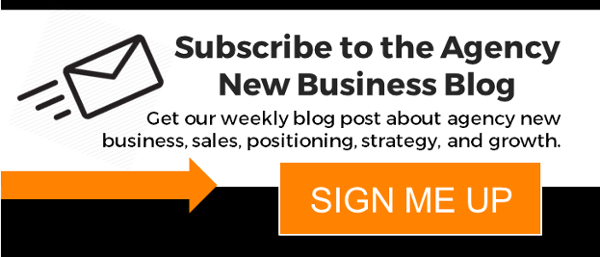Have you tried applying personality types to your agency sales process? Find out why your prospect's personality type can have a significant influence on your new business success — and how to use it to your advantage.
To excel in sales, you must provide the information the buyer wants in the manner they want to receive it. To do that, you need to understand personality types.
To help our sales efforts at The Duval Partnership, we use DiSC®, a personal assessment tool that measures Dominance, Influence, Steadiness, and Conscientiousness in individuals.

For obvious reasons, I’m not suggesting you ask clients and prospects to take a personality test. That would be an awkward conversation, indeed. Instead, familiarize yourself with the general personality types and use this information to inform your lead profile, alongside other lead intelligence.
It is also helpful for your salespeople to understand their own personality types. Most salespeople tend to communicate as if a prospect is the same personality type as themselves by default, which leads to lost opportunities. With practice, they can consciously change their approach to be more effective based on their audience.
Using DiSC personality types for agency sales
Here’s a quick overview of the four DiSC personality types and communication tips for each of them:
Dominant = D
About: The dominant personality type is often found in the C-Suite, in leadership roles such as CEO, CMO, or COO. The key characteristics that define this type are decisive, direct, tough, impatient, competitive, and independent.
How to approach this personality type when selling:
- Keep it results-oriented, stay on subject, be direct and brief.
- Focus on the task and stick to business.
- Maintain equal business stature.
- Demonstrate confidence and competence.
In emails: Don’t waste time on a warm greeting. Omit any fluff. Keep it short, easily scannable, making just one or two points about benefits (not features). Focus on what you can do for them, how you can solve their problem, and address only what they have expressed interest in. Clearly state the next steps, skipping the warm sign-off.
Influential = i
About: Most salespeople are i’s. The key characteristics that define the influential personality type are sociable, talkative, open, emotional, persuasive and talk more than they listen. I personality types tend to be focused on the big picture and greatly value their relationships.
How to approach this personality type when selling:
- Show enthusiasm, smile, and chat; be friendly.
- Let them talk; engage them by asking for their ideas and opinions.
- Avoid becoming too detail-focused; stay in the big picture.
- Avoid negativity, remain optimistic.
- Provide testimonials, case studies, and personal stories about how other customers have benefited from your agency’s solutions.
- Try providing a summary of what you’ve discussed to refocus them on key points when wrapping up.
In emails: Open with a warm greeting. Make a personal connection. Focus on the high-level view rather than details. Use paragraphs (a longer email may be OK here), but don’t come off as sales-y or give off sales pitch vibes. Close warmly.
Steady = S
About: The steady personality type is often found in mid-level marketing. They are team players and are most interested in building consensus. They value sincerity and dependability. The key characteristics that define the S-Style personality are calm, steady, laid back, caring and patient.
How to approach this personality type when selling:
- Take your time, avoid pressure, providing assurances and support.
- Avoid focusing too much on facts and numbers; you don’t want to come off as impersonal or make it feel transactional.
- Show your interest in them as an individual and make it clear that you value the relationship.
- Build trust.
In emails: Open warmly but professionally. Don’t skip formalities. Keep your word and follow through on the actions you say you will take. Be sincere and avoid pressure. Use a reasonable length email that provides relevant, substantive information. Any call to action should be minimal, such as a request for a quick call to answer their questions, followed by a warm closing.
Conscientious = C
About: An example of where you might find a C-Style personality type would be in the role of CFO or Procurement. The defining characteristics of this personality type are precision, skepticism, and discipline. They value quality and accuracy. This personality type tends not to express emotion.
How to approach this personality type when selling:
- Provide detailed information, and do not pressure them for immediate decisions.
- Keep the chatter or small talk to a minimum.
- Put things in writing for further review so they can make an informed decision.
- Providing comparison “cheat sheets” with pros and cons or anything that might minimize perceived risk (such as proof of results and guarantees) will go far with this personality type.
In emails: Use a formal greeting. Support any statements made with data. Be buttoned-up and diplomatic. Avoid casual expressions. Bullet points will appeal to this personality type. Don’t overstate results, outcomes, promises, etc. — they will notice. Include a process-oriented call-to-action that logically progresses toward a mutual goal and a formal closing.

Using Personality Types to Improve Agency Sales
Certainly, some people won’t fit neatly into one of these four generalized personality types. Nevertheless, they have practical application, despite their broad strokes.
If personality types are not already part of your lead profiling process, you will find them useful tools to become more effective in your new business outreach. Use them to shape your messaging and conversations for greater impact. You can even try matching and mirroring your word choices, tone, and physical movements to match your prospect's personality type.
Ultimately, this information will help you avoid lost opportunities. You improve your chances of connecting with prospects — and closing deals — when you speak their language and respect their preferred style of communication.
This blog was updated for accuracy and relevance on June 30th, 2021.
Read more:
- 4 Ways Agencies Mess Up New Business Outreach & How To Fix It
- How To Use Personalization In Emails For Agency New Business
- How to Have More Effective Conversations with Agency Prospects
- How To Get More New Business By Talking About Solving Client Problems
Image credits: Photo by Brett Jordan on Unsplash; Photo by Barthelemy de Mazenod on Unsplash



